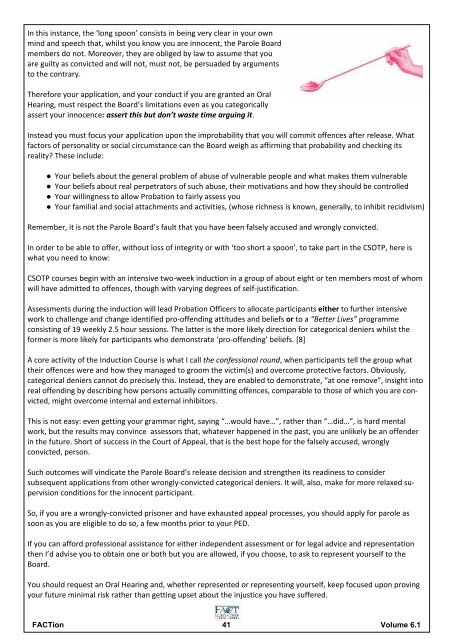FACTion-6.1-web-version
FACTion-6.1-web-version
FACTion-6.1-web-version
Create successful ePaper yourself
Turn your PDF publications into a flip-book with our unique Google optimized e-Paper software.
In this instance, the ‘long spoon’ consists in being very clear in your ownmind and speech that, whilst you know you are innocent, the Parole Boardmembers do not. Moreover, they are obliged by law to assume that youare guilty as convicted and will not, must not, be persuaded by argumentsto the contrary.Therefore your application, and your conduct if you are granted an OralHearing, must respect the Board’s limitations even as you categoricallyassert your innocence: assert this but don’t waste time arguing it.Instead you must focus your application upon the improbability that you will commit offences after release. Whatfactors of personality or social circumstance can the Board weigh as affirming that probability and checking itsreality? These include:● Your beliefs about the general problem of abuse of vulnerable people and what makes them vulnerable● Your beliefs about real perpetrators of such abuse, their motivations and how they should be controlled● Your willingness to allow Probation to fairly assess you● Your familial and social attachments and activities, (whose richness is known, generally, to inhibit recidivism)Remember, it is not the Parole Board’s fault that you have been falsely accused and wrongly convicted.In order to be able to offer, without loss of integrity or with ‘too short a spoon’, to take part in the CSOTP, here iswhat you need to know:CSOTP courses begin with an intensive two-week induction in a group of about eight or ten members most of whomwill have admitted to offences, though with varying degrees of self-justification.Assessments during the induction will lead Probation Officers to allocate participants either to further intensivework to challenge and change identified pro-offending attitudes and beliefs or to a “Better Lives” programmeconsisting of 19 weekly 2.5 hour sessions. The latter is the more likely direction for categorical deniers whilst theformer is more likely for participants who demonstrate ‘pro-offending’ beliefs. [8]A core activity of the Induction Course is what I call the confessional round, when participants tell the group whattheir offences were and how they managed to groom the victim(s) and overcome protective factors. Obviously,categorical deniers cannot do precisely this. Instead, they are enabled to demonstrate, “at one remove”, insight intoreal offending by describing how persons actually committing offences, comparable to those of which you are convicted,might overcome internal and external inhibitors.This is not easy: even getting your grammar right, saying “…would have…”, rather than “…did…”, is hard mentalwork, but the results may convince assessors that, whatever happened in the past, you are unlikely be an offenderin the future. Short of success in the Court of Appeal, that is the best hope for the falsely accused, wronglyconvicted, person.Such outcomes will vindicate the Parole Board’s release decision and strengthen its readiness to considersubsequent applications from other wrongly-convicted categorical deniers. It will, also, make for more relaxed supervisionconditions for the innocent participant.So, if you are a wrongly-convicted prisoner and have exhausted appeal processes, you should apply for parole assoon as you are eligible to do so, a few months prior to your PED.If you can afford professional assistance for either independent assessment or for legal advice and representationthen I’d advise you to obtain one or both but you are allowed, if you choose, to ask to represent yourself to theBoard.You should request an Oral Hearing and, whether represented or representing yourself, keep focused upon provingyour future minimal risk rather than getting upset about the injustice you have suffered.<strong>FACTion</strong> 41 Volume <strong>6.1</strong>


